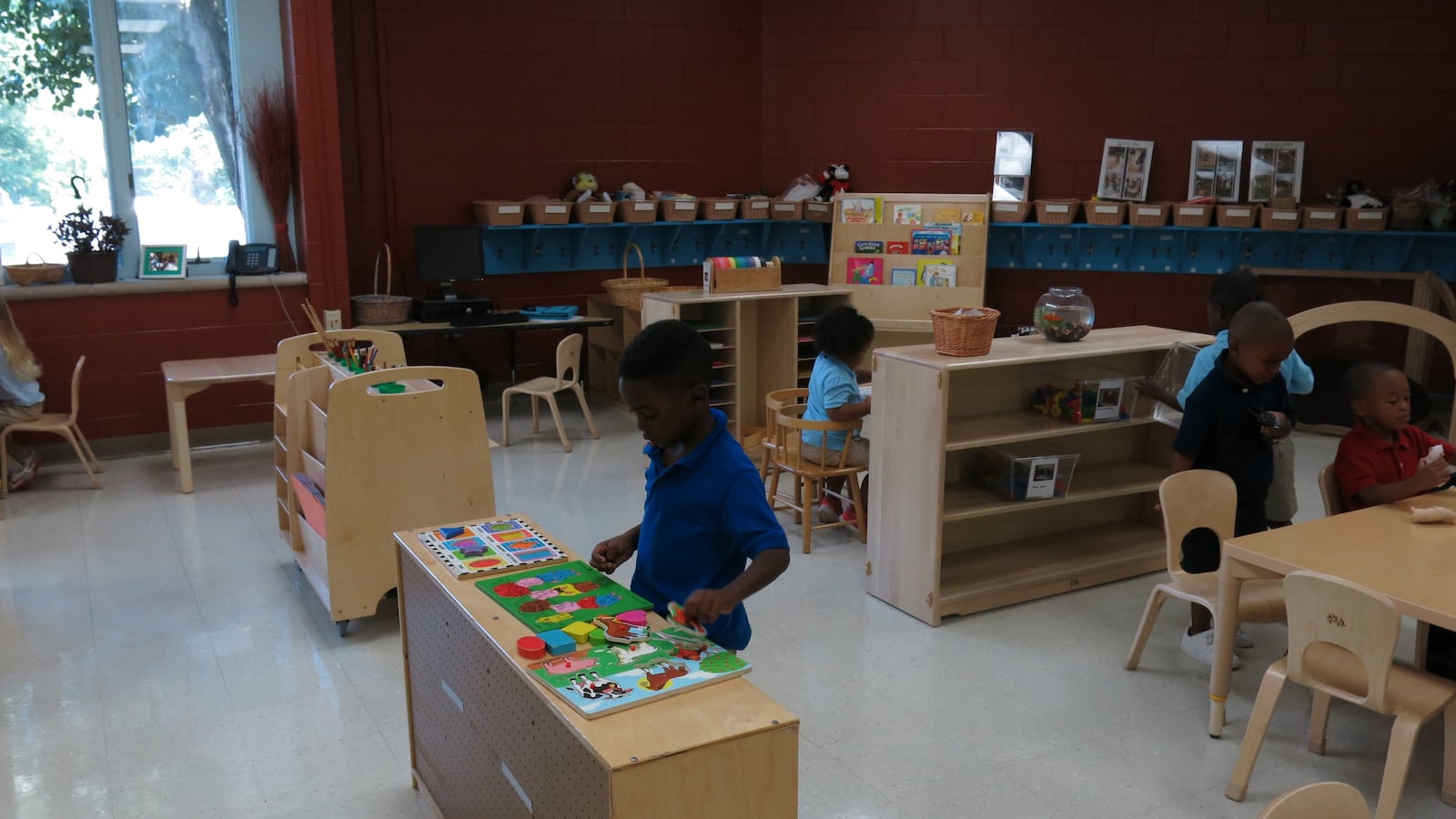A new Vanderbilt University study suggests that public pre-kindergarten programs in Tennessee might actually negatively impact students as they advance through school, surprising experts and advocates alike. But the study’s lead researchers say that policymakers shouldn’t abandon pre-K as they seek to close the achievement gap between minority and lower- and higher-income students.
The U.S. Department of Education-funded study, released on Monday, is the first to thoroughly investigate the impacts of state-funded pre-K programs, which are increasingly popular as policymakers across the nation promote pre-K as a salve for unequal educational opportunities.
Lead researchers Dale Farran and Mark Lipsey found that Tennessee’s pre-K program for economically disadvantaged children, called Tennessee Voluntary Pre-K or TN-VPK, is not producing the positive impacts on academic achievement in the later grades that its advocates and sponsors expected. However, they said the potential for pre-K should be further investigated.
“We’re pretty stunned looking at these data and have a lot of questions about what might be going on in the later grades that doesn’t seem to be maintaining, if not accelerating, the positive gains the VPK attendees made in pre-K,” Lipsey said in a news release.
The five-year study was a joint effort between the Tennessee Department of Education and Vanderbilt’s Peabody College of Education and Human Development, where pioneering experiments on the early education of “disadvantaged” children helped to inspire the creation in 1965 of early childhood programs under Head Start.
Gov. Bill Haslam has been waiting on the Vanderbilt study before determining whether he will propose spending more next year on pre-K. Haslam and state lawmakers have been hesitant to expand pre-K — some wanting to scrap the program altogether — citing a 2011 comptroller’s report finding that the impacts were negligible.
Vanderbilt researchers found that students who participated in TN-VPK benefitted significantly at first. But by first grade, there was no difference. By third grade, the students who attended pre-K actually fared worse on a variety of measures assessing both academics and behavior.
“We’ve got a platform out there that’s serving thousands of disadvantaged kids (in Tennessee) who are worthy of our attention,” Lipsey told Chalkbeat. “If we’re not getting what we wanted yet from that platform, we should at least explore its potential before we give it up.”
Groundbreaking report
National experts called the Tennessee study important and compelling.
“It’s a very exciting report because it’s the first time it’s been done on a state level,” said Bruce Atchison, director of early learning for the Education Commission of the States.
“The fadeout is definitely disappointing, but in the context of other studies, the Tennessee findings suggest that we need to raise the quality of programs to avoid the fadeout. It punctuates the fact that pre-K alone is not a silver bullet,” said Bruce Fuller, a professor of education and public policy at the University of California-Berkeley.
Both Fuller and Atchison questioned whether uneven or mediocre elementary programs might contribute to a flattening out of academic performance by second and third grades.
“You can have high-quality pre-K and talk about a kindergarten-ready child,” Atchison said, “but if you don’t have a high-quality K-3 programs in place, some fadeout is going to occur.”
Kyle Snow of the National Association for the Education of Young Children called the report “courageous” for going against popularly held beliefs in the policy community that pre-K is a panacea. He said he eagerly awaits follow-up from Farran and Lipsey on what factors in elementary school interacted with the skills learned in pre-K to cause students’ achievement to decline, after initially outperforming their peers.
“What is so important about this study is that it leads to these questions about sustaining gains and momentum,” he said. “What is the (elementary school) environment doing to support these skills?”
Payoff vs. cost
Tennessee’s Voluntary Pre-K program, which was started about a decade ago and cost about $86 million in 2013-14, serves about 18,000 children. It ranks high among state-funded pre-K initiatives, meeting nine out of 10 benchmarks set forth by the National Early Education Research Institute for quality pre-K.

Farran and Lipsey launched the study in 2009, focusing on 3,000 students who applied. They compared the academic trajectories of students who gained seats through a lottery system, to those who applied for the program but didn’t make it in. All of the students were eligible for free and reduced lunch, a requirement for Voluntary Pre-K. The results only reflect students whose parents gave the researchers consent. Lipsey and Farran are still waiting for data for the rest of the students — almost 2,000 — from the Department of Education and will continue tracking them through the sixth grade. The researchers hypothesize there might be some potential long-term behavioral gains associated with attending pre-K.
Rep. Bill Dunn (R-Knoxville), a member of the state House Education Committee, called the study “invaluable.”
“When you’re in government, the question you always asks is how do we use taxpayer dollars effectively and efficiently,” said Dunn, a vocal critic of spending on pre-K. “This study would lead one to believe this approach isn’t very effective and efficient.”
Dunn said he’d rather see state dollars go to improve teacher quality. A more effective pre-K program, he said, might be to prepare at-risk students for kindergarten during the summer leading up to school, rather than the whole preceding year.
“We can help some of these at-risk kids get ready for kindergarten without spending all of that money,” he said.
Tennessee Education Commissioner Candice McQueen said the department is continuing to focus on improving the quality of existing pre-K programs across the state. “This is why the department is anchoring our work on establishing early foundations for our students and monitoring and emphasizing high-quality pre-K instruction,” she said. “We also believe that it is important that the Vanderbilt study continues to follow student gains over time to better understand long-term outcomes.”
Farran said policymakers should remember that classrooms observed in the study were diverse in their approaches — and that much can still be learned from the classrooms that did see positive impacts on students in later grades. Farran and Lipsey also are further evaluating the 160 Voluntary Pre-K classrooms that were part of the study to ascertain what qualities most helped children in kindergarten, first, second and third grades.
“TN-VPK was rolled out very quickly and not all pre-K classrooms in Tennessee are alike,” Farran said in the news release. “What might you get from the same pre-K program if you had a common vision and could push the quality up? These are among the questions we are raising in light of the findings of our study.”
"Pre-K is a good start, but without a more coherent vision and consistent implementation of that vision, we cannot realistically expect dramatic effects."
Dale Farran, Peabody researcher
Lisa Wiltshire, executive director of the Tennessee Department of Education’s office of early learning, said during a roundtable discussion last week that a common vision and common standards for pre-K classrooms is one of her top priorities.
The researchers emphasized that the potential of pre-K to produce positive academic achievement cannot be dismissed.
“Pre-K is a good start, but without a more coherent vision and consistent implementation of that vision, we cannot realistically expect dramatic effects,” Farran said. “Too much has been promised from one year of pre-school intervention without the attention needed to the quality of experiences children have and what happens to them in K-12. There is much work to be done.”
Read the full report here.

